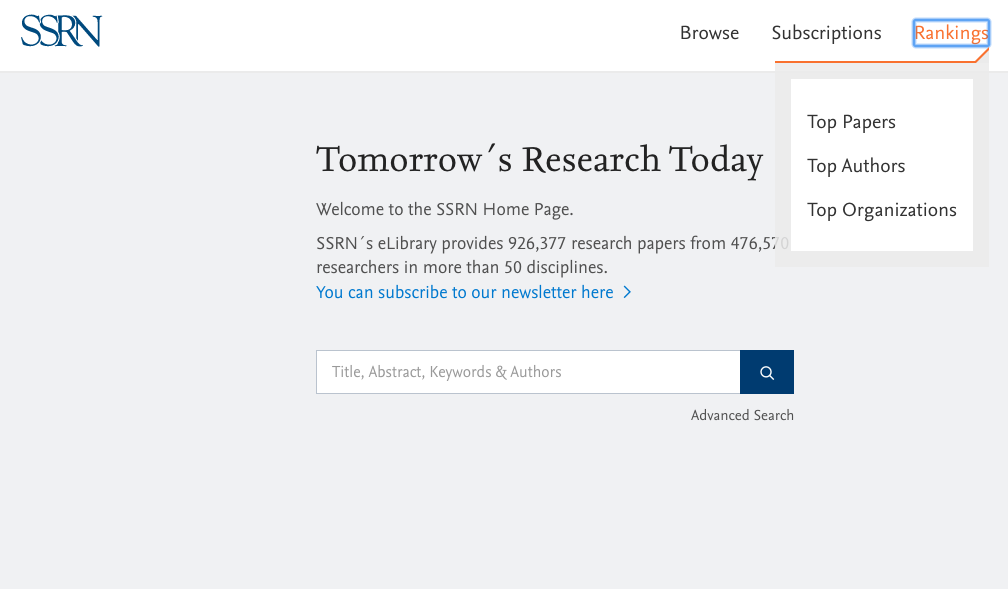Social Science Research Network
CategoriesI liked Malcolm Gladwell after reading The Tipping Point and I love his podcast Revisionist History. On a long drive the other day I finished Season 4, episode 10 - The Obscure Virus Club. It was about three biologists from last century branded as pariahs for their belief that a virus could use RNA to replicate itself into mutated DNA. The Central Dogma of genetics stated that DNA makes RNA which makes proteins, and the concept that RNA could mutate DNA, the blueprint, was found laughable. Eventually these men discovered an enzyme, reverse transcriptase, that enabled RNA to change DNA. This discovery, reached despite five decades of ridicule, lead to the early identification and understanding of AIDS, among other retroviruses, allowing earlier mitigiation opportunities and saving countless lives. The Nobel Prize was awarded for this work.
I've listened to many episodes of Revisionist History but Season 4, Episode 10 was the first reference I heard to SSRN. The Social Science Research Network is "the greatest website on the internet - for dorks" according to Malcolm. It's a centralised and indexed collection of scholarly articles and research, all integrity-verified by staff. Search filters include Title, Author and Keywords, Top Papers, Top Authors and Top Organizations, subscription is available by categorical networks (Medical or Linguistics) or by discipline (Teaching & Learning or Life Sciences). So I can browse the ten most downloaded today or I can search for "Growing the greenest grass" or I can subscribe to ArchRN because I am an architecture dork. Oh, and it's free!

Friends and family have been privy to my excitement about this research in the eleven days since I listened to Season 4, Episode 10. Not all of them have cared. But as educators I thought you might personally like an introduction, and at the least you could pass it to your students as a resource, if you haven't already.
So here are my Top 5 papers so far:
Should Law Subsidize Driving? (Shill, 2019) Totally Fascinating!! For a long time I've been flapping my lips to everyone who didn't want to know about my belief that those who claim chicken farmers should care for their chickens more responsibly fail to realize $0.99 eggs by the dozen are the culprit. Start spending $0.60 per egg and the chickens will have better lives. This paper outlines in vast detail the fact that America is legally biased toward automobile drivers. With all this accusation floating around about drivers and greenhouse emissions we often fail to recognize that our laws and economy encourage private transportation and discourage pedestrain and public transportation alternatives.
Christianity, the Fall of Man, and Redemption (Zambakari, 2018) I grew up in Catholicism, I like religion, and I particularly like viewing it from different perspectives. I think it's alright to study something from a perspective that might not be your own and learn something whether you agree or don't. This paper is not a refutation of Christianity, and it's not necessarily about religion; he uses it as an example to point out that a set of rules given as a solution to a problem only makes sense if the solution-seeker believes in the problem. This can be applied to almost anything.
Validity and Reliability of the Research Instrument; How to Test Validation of a Questionnaire/Survey in a Research (Taherdoost, 2016) This has formulae outside my comfort zone but also describes the methodology for assigning value to surveys in simple terminology. We love surveys but don't usually take the time to think about whether they are correctly designed to answer the intended questions. This paper offers a method to grade a survey's ability to do so and educates us on how to properly generate one. It's a really useful skill.
Day Trading for a Living? (Jackson, 2011) This one quanititatively demonstrates how difficult it is to make money day trading as a private citizen in competition with high-frequency trading programs, and how the 3% who make money earn less than a low-level income. I wasn't tempted to day trade but have friends who regularly try convincing me they are great at it.
I Didn't Want to Offend You: the Cost of Avoiding Sensitive Questions (Hart, VanEpps, Schweitzer) I saved the best one (or my favorite, at least) for last. Results given in this paper suggest that question askers more often avoid the asking of sensitive questions to create a favorable impression and to avoid discomfort and typically overestimate potential discomfort in social situations. Aversion to asking of pertinent questions considered sensitive was found unneccessary and costly, as question receivers were equally favorable of those who did and did not ask sensitive questions and found questions to be less sensitive than the askers had assumed. If you ask around at the office I will be widely accepted as lacking sensitivity, so this paper might have my bias.
Anyway, you get the idea. This is like Reddit without all the inside jokes and foolishness - a giant, user-populated index of verified research on any topic you want to know about. I hope you find it useful and as entertaining as I do.
Here are a few classes related to this topic:
 Teaching Algebra with Technology
Teaching Algebra with Technology
 21st-Century Learners: Reaching and Teaching the iGeneration
21st-Century Learners: Reaching and Teaching the iGeneration
 Student-Centered Classrooms: A Constructivist Approach
Student-Centered Classrooms: A Constructivist Approach